#pro wrestling freedoms
Explore tagged Tumblr posts
Text
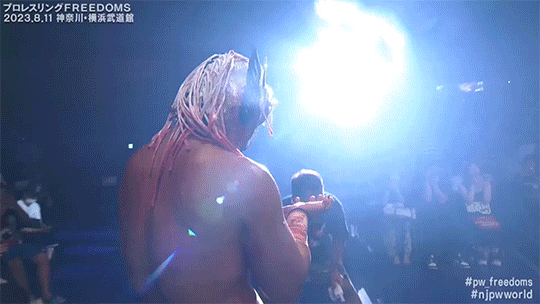
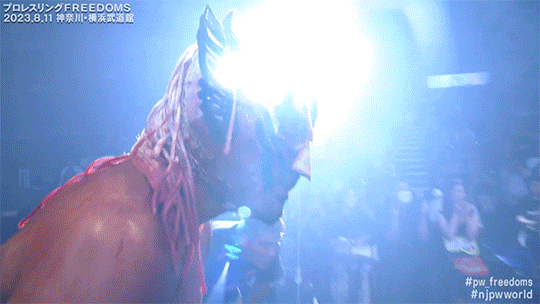
the mask used to be white.
183 notes
·
View notes
Text
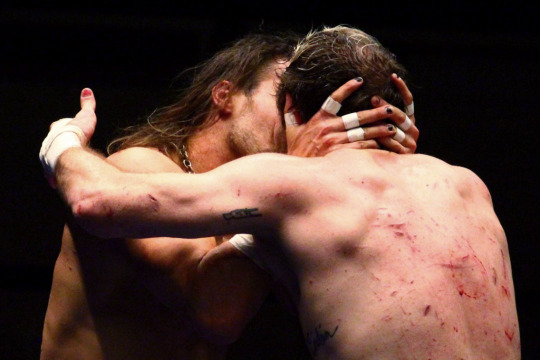

📷: ぢっちゃん
#drew parker#effy#pro wrestling freedoms#gcw#freedoms/gcw 13th anniversary#deathmatches#hello drew nation
76 notes
·
View notes
Text
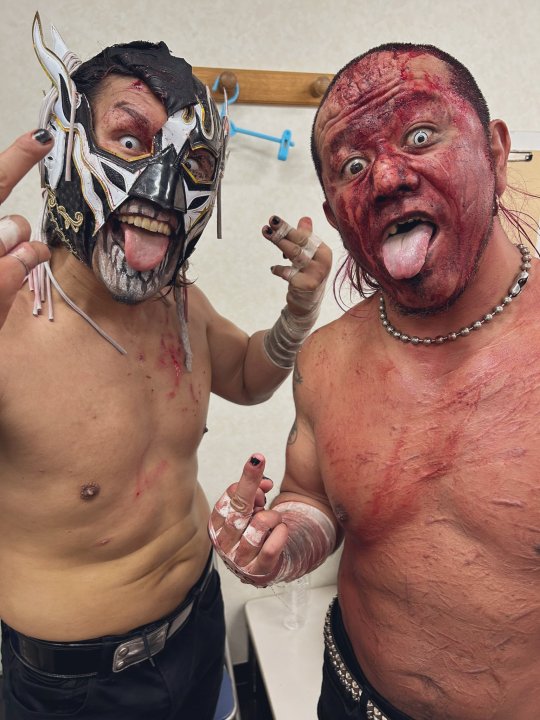
32 notes
·
View notes
Text



#they worked pretty great together and Homare is! so! cute!#jun masaoka#gaia hox#homare#dragongate#pro wrestling freedoms#f swag
2 notes
·
View notes
Text
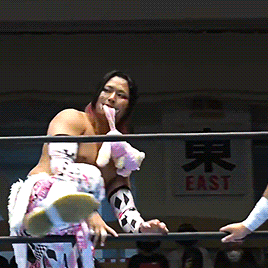
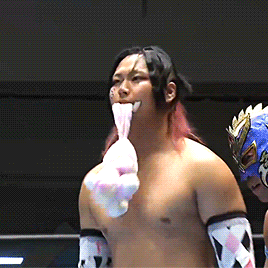
#takahiro katori#njpw#njpw strong#njpw independence day#freedoms#pro wrestling freedoms#pw freedoms#the bunny went on an adventure in this match i can tell ya#my gifs
18 notes
·
View notes
Text



4 notes
·
View notes
Text
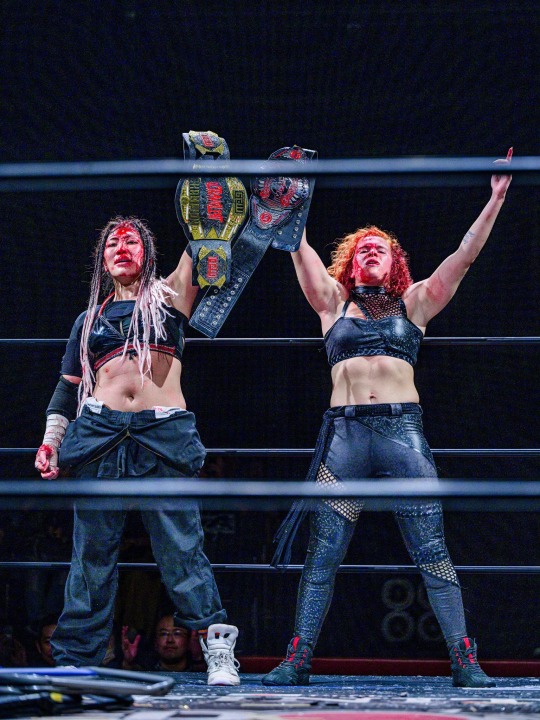
credit: Norihon
4 notes
·
View notes
Text
Masashi Takeda vs. Yusaku Ito, FREEDOMS/Jun Kasai Produce Tokyo Death Match Carnival 2024 Vol. 1, July 11, 2024
I’m still playing catch-up to the highest ranked matches of the year, according to the Cagematch voters. This Fluorescent Lighttubes Glass Board Trap Death match stood out as the most prominent death match of the year. Since Masashi Takeda’s Light Tubes, Giga Ladder & Glads Board Death match against Isami Kodaka from June 2018 still stands out as one of the best death matches I’ve ever seen, I felt obligated to check out this match.
Deathmatch wrestlers are often derided for relying on weapons and blood because they’re not talented enough to just wrestle. I disagree; it takes skill and talent to make deathmatch wrestling compelling enough to override the autonomic disgust at the sight of blood. It’s one thing to throw light tubes at each other; it’s another to use them to support the dramatic tension that wrestling can support.
Takeda is one of the best deathmatch wrestlers in the world because he is able to tease the violent bloodletting, deliver on it fully, and build a compelling story around the destruction. Plates of glass and barbed wire trampolines are his Five Moves of Death, the punctuation points that uses to close his bloody statements.
The problem is that he needs an opponent who can keep up with him. I thought Ito started off well by throwing a light tube at Takeda, and they had, on paper, an absolute war with the light tubes, their finishers, a duplex on to the barbed wire web, and a pot and a cinder block. I think I had the same problem here that Inhad with Necro Butcher vs. Roderick Strong: once you’ve smashed a man over the head with a cinder block, I just don’t think that putting the man through some more light tubes trumps the damage to the body or the spirit that’s already been inflicted.
Still, there wasn’t a cooler shot in wrestling than the shot from the crowd of the glass pane exploding in the corner.

#freedoms#jun kasai#pro wrestling#wrestling#deathmatch wrestling#pro wrestling freedoms#masashi takeda#yusaku ito
0 notes
Text
25.DEC.2022


PRO WRESTLING FREEDOMS: PRODUCE BLOOD XMAS 2022 // puroresukyoko
276 notes
·
View notes
Text
Last year, Kasai Jun was interviewed as part of the interview project DEATH, which interviews various people about death in order to find a better understanding of how to live and appreciate life.
I thought it was a fascinating interview, so I decided to translate it.
Please go visit the original interview - the photography accompanying it is absolutely gorgeous.
Also, please don't repost this whole translation elsewhere. If you want to quote an excerpt of my translation for something, please make sure to also credit the original team behind this interview and link back to the original interview.
Deathmatch Fighter Kasai Jun - 4/27/2022

“It’s not a deathmatch until you return home alive” The reason this 47 year old Charisma Wrestler continues to shed blood in the ring
Within pro wrestling, there is a genre called “deathmatch.”
An extreme set of rules that allows deadly weapons and has no disqualifications. Brawls with fluorescent light tubes, and dives onto barbed wire boards. Without hesitation, wrestlers stab their opponents in the head with fistfuls of bamboo skewers. When wound-covered bodies violently collide, shards of glass and sprays of blood shower the ringside seats.
Upon first seeing it, surely everyone thinks “Why are these people hurting each other like this?” “What the hell am I looking at?”
This is the world of the man known as “Charisma,” professional Wrestler Kasai Jun of the independent promotion Pro Wrestling Freedoms.
In November of 2009, he had a “razorblade board plus alpha deathmatch” against Ito Ryuji in Tokyo’s Korakuen Hall. Kasai, 35 years old at the time, dove from the second floor balcony, a fall of 6 meters, onto a table, aiming for his opponent Ito.
Afterwards they continued to fight with various weapons, in a match that concluded 15 seconds before the 30 minute time limit. That year, this match was awarded the Best Bout award. And Kasai, the winner of that match, became a living legend overnight.
12 years have passed since then. Kasai is now 47 years old, and he continues to rule over the world of deathmatch wrestling. Under the weight of many literal life-or-death battles, Kasai’s body no longer moves the way it did when he was young. Even so, why does he continue to set foot in such a dangerous place?
We asked “Charisma of Deathmatch” - a man who makes the crowd go mad in the space between life and death - about his views on death and on life.
Desiring to truly feel alive
- Normally, people try to avoid pain and suffering. Kasai, why do you continue to shed blood in the ring?
Hahaha. From an outside perspective, you must really wonder “Why do you keep doing something so painful” huh? That’s a normal way to feel. But from the wrestler’s perspective, it’s completely different.
In your normal daily life, do you ever feel like “Ahh, it’s so glorious to be alive”? You’d almost never unconsciously blurt out something like that.
But in a life or death battle in a deathmatch ring, after you step down from that ring, that’s exactly what you feel. “Ahh, I’m alive. I’m so grateful to be alive.” Because of that, I can’t quit.
Mountain climbers and stuntmen probably feel like this too, don’t they. Stepping into a situation where their life could end, and returning home safely. I wonder if they’re searching for that feeling of being “truly alive.”
This feeling is passed on to the audience too. Fans often tell me “Watching Kasai Jun’s deathmatch gives me the strength to continue forward.”
They say things like, “I’m being bullied at school so I wasn’t going to go any more, but now I feel like I can keep going.” Or, “It’s exhausting to keep going to work, but after seeing Kasai persevere while shedding blood in the ring, I can persevere and keep going to work.”
Recently I can’t do this much because of covid, but in the past when I’d sell merch, fans would often say things like this to me.
Because of this, it seems to me that deathmatch wrestling is simultaneously a way for wrestlers to feel truly alive, and a way for those who watch it to feel more positively about living.
- Because of the sensational way “death” is shown in the ring?
Probably, yeah. Because it looks like we’re doing something really painful.
But don’t get me wrong. We aren’t in a particular hurry to die. And we aren’t wasting our lives either. What I always say is, “It’s not a deathmatch until you return alive.”
[Note from me - this phrase (生きて帰るまでがデスマッチ) is a play on a well-known Japanese phrase 家に帰るまでが遠足 “The field trip isn’t over until we return home.” This started as something a teacher would say to students in their care, and Kasai has altered it into his motto towards both himself and other deathmatch wrestlers.]
- It’s not a deathmatch until you return alive.
If you get in a ring where you might die or get seriously injured, and you do die, or you do get seriously injured, you’re no different than a rank amateur, right? But a guy who dives into a deadly dangerous situation and returns from that ring unharmed, he’s the absolute greatest and the absolute coolest.
Like a stuntman, right? If he returns home alive, people say “amazing,” but if he dies, he’s no longer a pro.
At 35 years old, his view on life did a complete 180 during a match
But, when I was young, I thought about it completely differently. I never thought “I’m grateful to be alive.” In the ring, I did dangerous stuff and defeated my opponents. I just thought of it as my job.
The more dangerous stuff I did, the more people said “Kasai is amazing!” That felt really great. Every time I stepped into the right I thought, if something goes wrong and I die I guess that’s how it goes. I thought “Deathmatches should be a memento mori.”
- What caused such a big change in your values?
That match against Ito Ryuji in Korakuen, in 2009. It changed my mental state by 180 degrees.
The truth is, I went into that match thinking “This is my last match before I retire.” Because it was my last match, I would do everything I wanted to do. Win or lose, I went into the ring thinking “I’ll retire.”
But during the match, my feelings completely changed. I thought “If I quit like this, I’ll be half-dead.” There’s nothing else I want to do, and I’ve never felt joy like this anywhere else. It was just too much fun.
So, after the match ended with 15 seconds remaining, I announced my decision to continue wrestling. “I was thinking of retiring but, I’m gonna keep going.” That’s what changed.
- Since your values have changed so significantly from when you thought it’d be good to die in the ring, what’s your “ideal death” now?
Spending the day with my family as I always do, watching tv with an after-dinner drink as I always do, getting comfy in my futon as I always do, and passing away. That’s the best death, isn’t it.
I’ve said it before but, people who say “It’s my ambition to die in the ring” are just trying to look cool. For a pro, it all comes down to returning home alive. And so, I believe that when the life of Kasai Jun the human being comes to an end, Kasai Jun the wrestler will die as well. I want to be a pro wrestler until I die. That’s how I feel now.
When I was young, I thought the best time for a wrestler to retire was when he could still move, when people would say “It’s a shame, because there’s still more he can do.” But if that’s true, I’ve already missed my best time to retire.
Since I’ve come this far, maybe it’s better to keep doing this until my death. Since around the time I turned 40, I started thinking this way.
Gaining years = leveling up. I’ll reach my peak just before death.
- Since you’ve been doing this for so long, it’s inevitable that your body has become weaker. Kasai, how have you dealt with aging?
The word “elderly” is a concept created by human beings, isn’t it? Since that’s the case, I believe it’s something we can absolutely overcome. I don’t think increasing in age is the same as becoming elderly.
Look, it’s true that my physical stamina has decreased and my muscles have gotten weaker than they were when I was younger. But my will and my spirit have continued to grow. Instead of just breaking even, I think I’ve leveled up. 47 years old is level 47. I now see growing older as a positive, like leveling up every year.
Because of that, my peak has yet to come. I’ll reach my peak just before I die. I’ll be at my strongest just before my death. That’s the ideal I envision for myself.
There was a time when I felt insecure about my age. When I hit my mid 30s, I hated that my body was becoming weaker.
But then, while drinking at home and watching a documentary on TV about (rock musician) Yazawa Eikichi, I realized something. “If you think about it, uncool young people are uncool, and cool guys are cool even if they’re old.” Since then, my way of thinking changed. I started calling getting older “leveling up” at around that time.
[Note from me: Suzuki Minoru also refers to getting one year older as “leveling up” in the exact same way. They are friends, so I assume Suzuki got it from Kasai.]
- I'm surprised that a pro athlete who uses his body as a weapon would think of aging in that way.
Pro wrestling and deathmatch are unique among sports. Unlike say, track and field, or swimming, it isn’t a competition where every second counts. I can’t move the way I could when I was young any more, but through my facial expressions, pauses during matches, and so on, I have many ways to express myself.
A guy can be handsome, macho, with great muscles, and completely suck as a wrestler. In contrast, a guy like me who’s ugly, short, and middle-aged, can get support from the fans. It’s a completely different genre, and that’s what makes pro wrestling so interesting.
- What about your emotional struggles? In your documentary film you said you were having some difficulty maintaining your motivation, which you described as “Deathmatch Erectile Dysfunction”
Yeah, well, that can definitely be a problem. When you’re young, you’ve just got piles of hopes and dreams and things you want to do. But as the years go on, and as you accomplish those things, you can kind of get lost.
What’s helped me increase my motivation has been the existence of people who make me think “I absolutely don’t wanna lose to this guy” or “I don’t want this guy to take all the best stuff for himself” In my case, for example, that’s been (fellow PW Freedoms deathmatch wrestler) Takeda Masashi. Or, although he’s from another organization, New Japan Pro Wrestling’s El Desperado.
That’s why for the past 3 or 4 years, I’ve been asking people to “stimulate me.” I want intimidating people to keep approaching me. Well, on the other hand, if they take the most delicious part for themselves, that’s a problem.
A fear of death led to a “selfish life”
- Incidentally, perhaps it’s too late at this point, but do you worry about being injured or dying?
I said it already but, “It’s not a deathmatch until you return alive.” Since I’m a pro, I have the skills required to do this without death or injury.
But, it’d be a lie to say “I’m not afraid.” Even now, for several days before a match I get so stressed that I can’t sleep. Despite how I look, I get plenty scared. Much of my life has been driven by a strong fear of death.
- How do you mean?
It sounds silly, but when I was in grade school I believed in “The Prophecies of Nostradamus.” Have you ever heard of it? “In the year 1999, all of humanity will be destroyed.” Every night I shook with fear in my futon, thinking that my life would end at the age of 24.
Propelled by that fear, I concluded, “If the earth is gonna get destroyed anyway, I should quit studying. Instead I should use the rest of my remaining lifetime to do stuff that I like.” I completely quit studying, and instead spent all my time watching pro wrestling, which I loved.
Conversely, my fear of death also led me to become a pro wrestler. After graduating high school, I got a job in Tokyo as a security guard, but I gave into temptation and visited brothels daily. One day I happened to be reading a magazine with an HIV checklist inside, and almost every item applied to me.
At that time, I still thought “AIDS = death” so I thought “Oh, this is AIDS.” “Oh, this is how I’ll die.”
Luckily, when I got tested the result was negative, but after preparing myself for death, I thought “I really should do what I want” and knocked on the door of Big Japan Pro Wrestling. My life has always been influenced in this way.
- I get the impression that many wrestlers die at an early age. Since then, your fear must have increased.
Nah, that’s not really true. I’m surprisingly practical about the deaths of others. I just accept it, like “That’s the kind of life you lived.” I suspect my fear of death isn’t a fear of death itself, but a fear of becoming nothing.
- A fear of becoming nothing.
I’m no (actor and spiritualist) Tanba Tetsuro, but if after you die, you go to the spirit world, and cross the Sanzu river, that’s not all that scary is it? I wouldn’t go so far as to say “it’s fine if I die” but there’s some kind of hope or meaning. But if “After death, you become complete nothingness” “After death you feel no joy or sadness” I think that’s really scary.
But these days, I don’t experience that fear of death as much as I used to. If after this interview a dump truck hits me and I die, I wouldn’t have any regrets. I could say I did what I wanted to do.
Pro wrestling is a business where you depend on your popularity with an audience, but I’ve never tried to flatter the audience to get sales or support, or thought about how to increase my popularity. Ultimately, Kasai Jun puts himself first. I’m my own number one.
To die without regrets is to win at life
- But, if someone wanted to imitate your way of life, I think most people would be profoundly afraid of not getting by financially, or of being rejected by society. Why do you think you remain stoic in the face of such fears?
What’s there worth imitating about me? If you’re selfish like me and you can change it, you should want to!
But, this is probably related to that “fear of becoming nothing” I mentioned earlier. Ever since I was little, I’ve thought stuff like “This whole world isn’t real” and “Maybe all of this is just a dream.”
Nothing in this world is certain. Since that’s the case, all you have are your own body and your own feelings. In short, I don’t believe in anything but myself, so I put myself first.
- So in order to “feel truly alive” you throw yourself into the painful world of deathmatch wrestling, which leads us back to where we started.
That’s right. I guess you could say that pain is the only thing I believe.
But when I was young, I did understand the fear of not making enough money to survive. When I was around 30 and my son had just been born, I was seized by that fear.
Really, I was broke, and I couldn’t even pay into the National Pension Fund like I was supposed to, so I went to the ward office and said “I do intend to pay, so please wait a little.” I thought to myself, “Living is so expensive and so difficult.”
- A deathmatch fighter scary enough to quiet a crying child, with such an everyday problem.
Three years after my debut, when I was around 27, I was badly injured. I quit Big Japan, and after a year’s absence, I transferred to a different group called Zero-One.
Zero-One was founded by ex-New Japan Pro Wrestler Hashimoto Shinya, and the pay was good compared to Big Japan, and they held a lot of shows, so I could wrestle frequently. The environment there was very pleasant.
But, due to the policy of the organization, I couldn’t do the deathmatches that I love. During that time as a “salaryman wrestler,” I survived, but I think deathmatch fighter Kasai Jun, pro wrestler Kasai Jun, was completely dead.
“I really should do the pro wrestling I want to do,” I thought, and I quit Zero-One, and persisted with the pro wrestling that I love. Maybe that’s why I feel like I can now “die without regrets.”
Ultimately, if you live your own life as you wish, and think “I have no regrets” when you die, you win. Maybe people today have lost sight of the essence of what it means to live. It’s fine to work hard at your job, but if you’re spending every day miserably, is that kind of life really okay with you?
I’d rather live for 20 years and laugh every day than live for 100 years and never smile. If you’ve lived for 100 years and never laughed, that’s the same as being dead, isn’t it?
~
写真:本永創太 ~ Photographer: Motonaga Souta
執筆:鈴木陸夫 ~ Author: Suzuki Atsuo
編集:日向コイケ(Huuuu)~ Editor: Hinata Koike (Huuuu)
#kasai jun#jun kasai#pw freedoms#pro wrestling#deathmatch#my translation#This is definitely the longest thing I have ever attempted to translate!#I've got nobody checking over my work or anything like that so as always apologies for any typos or errors that I didn't catch
311 notes
·
View notes
Text
RINA YAMASHITA 🩸🩸🩸

111 notes
·
View notes
Text
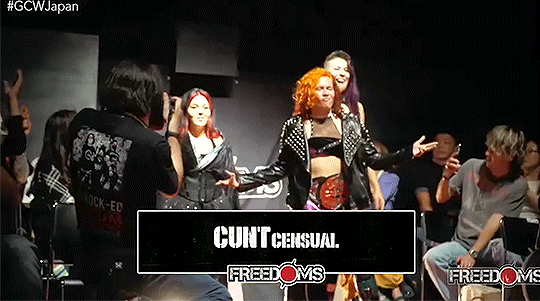
oh okay based name.
180 notes
·
View notes
Text

📷: mai7125
#drew parker#masashi takeda#and jun kasai in the back#pro wrestling freedoms#the gekokujo 2023#deathmatches#forgot i had more drew drafts
20 notes
·
View notes
Photo


山下りな (Rina Yamashita)
Photographed by Earl W. Gardner
#rina yamashita#freedoms#gcw#nomads#pro wrestling#joshi wrestling#joshi puroresu#japanese wrestling#puroresu#<3#she is da most beautiful woman in da world
89 notes
·
View notes
Text

2 notes
·
View notes
Photo
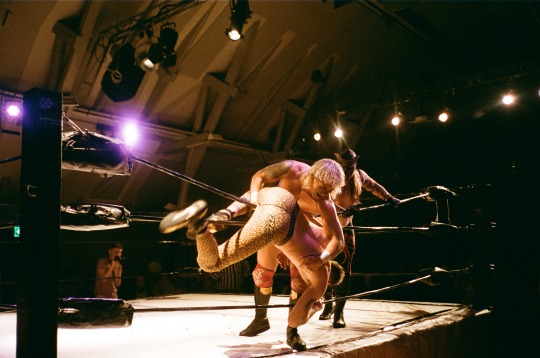
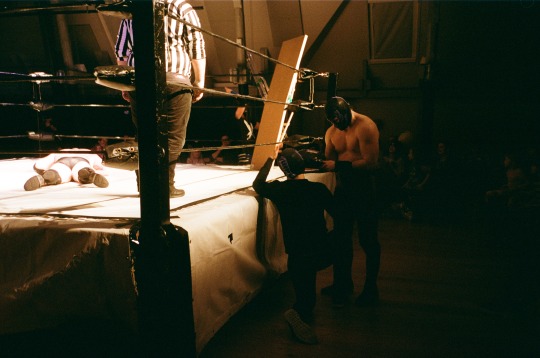
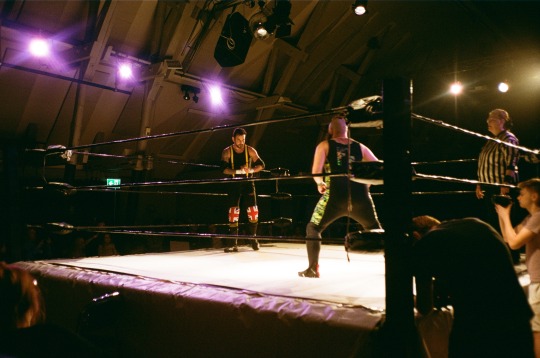
had the honor of shooting freedom pro-wrestling’s “golden finale” last weekend. spur of the moment thing, so i had limited film to work with. super excited to return next time with some proper equipment
also i am absolutely quitting my day job to become a wrestling photographer, mark my words
#freedom pro wrestling#leyton buzzard#benny bacchus#demon lock#the strangler#feyyaz aguila#jack jones#wrestling#mju ii#35mm#portra 400
8 notes
·
View notes